All Aboard The Australian Political Change Bus: Why Does It Usually Run So Late So Often?
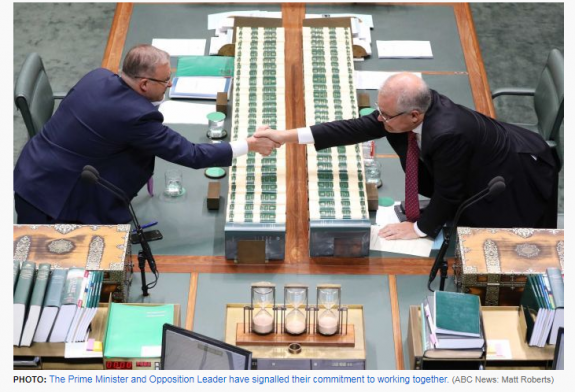
By Denis Bright
At last political spin doctors want Australians to move on from the rhetorical victory laps of the federal LNP after its surprise victory on 18 May 2019. Cheering on the victory laps cannot go on indefinitely even if sections of the federal LNP still want to continue the polarising rhetoric on issues like the need for more coal fired power stations for North Queensland to compete with One Nation in regional seats at next year’s state election (The Australian, 29 October 2019):
Scott Morrison and Matt Canavan reportedly had a heated argument over a new coal-fired generator in Queensland with the Resources Minister overheard shouting “this is f***ed” during the closed-door meeting.
Tensions over the roll-out of a new coal-fired generator at Collinsville in central Queensland boiled over during a fiery exchange in the Prime Minister’s office in Canberra last Tuesday, The Courier Mail reports.
The clash was reportedly so loud it was heard by others waiting in the corridor outside, including first time MP Phil Thompson and Capricornia MP Michelle Landry.
The war-of-words is alleged to have been sparked by a “go-slow” directive given by the Prime Minister’s Office on a business case for the new generator.
During the election campaign, Senator Canavan announced a $10 million study to develop the business case for baseload power options, including in Collinsville.
The row came amid a split in Coalition ranks over its drought funding strategy last week, with Nationals MPs blindsiding Scott Morrison with a $1.3bn policy document leaked without approval from leader Michael McCormack.
Such antics were destined to prepare for a polarising Queensland state election in late 2020. Most constituents alas are perfectly aware of the financial and environmental costs of climate change and the pragmatic value of energy transition strategies. Unlike the National Party, the wider federal LNP must also hold marginal metropolitan seats where Pauline Hanson is no folk hero.
Even the local news on 4CA in Cairns projected a strong environmental theme (30 October 2019):
The scientific community has shown that the Great Barrier Reef is in imminent danger of massive damage and, ultimately, complete loss unless global warming is limited to 1.5C.
Report author Bill Hare, director of Climate Analytics, said: “If Queensland continues to emit carbon pollution from energy use at the same rate as in 2017, the state’s Great Barrier Reef safe carbon budget will be used up in less than 12 years, by 2031.
“As the highest carbon-emitting state in Australia and custodian of the Reef, Queensland urgently needs to get its house in order and do its bit to limit warming to 1.5oC.
“To ensure that Queensland’s carbon emissions stay within a carbon budget consistent with global efforts to meet the Paris Agreement limit of 1.5oC, Queensland needs to cut energy and industrial emissions by a total of 58% by 2030 (compared to 2005 levels) and reach zero carbon emissions by 2050.
“The good news is that there are tremendous opportunities for Queenslanders in a decarbonised economy due to its cheap and plentiful solar and other renewable energy resources, advanced industrial capabilities and existing resource industry and infrastructure.
“For Queensland to take advantage of these opportunities and stay within the carbon budget it is of vital importance for the government to develop a whole of economy Great Barrier Reef safe strategy.”
State Labor currently holds four seats of Cook, Cairns, Barron River and Mulgrave in the 4CA catchment. The seats of Hill, Hinchinbrook and Traeger in the regional hinterlands from the Coral Sea to the NT Border are held by the Katter’s Australia Party (KAT).
In this time to move on from the 2019 national election campaign, Anthony Albanese used the CEDA forum on 29 October 2019 to offer a broad-church strategy from the Labor Party as the State of the States Report from CommSec.
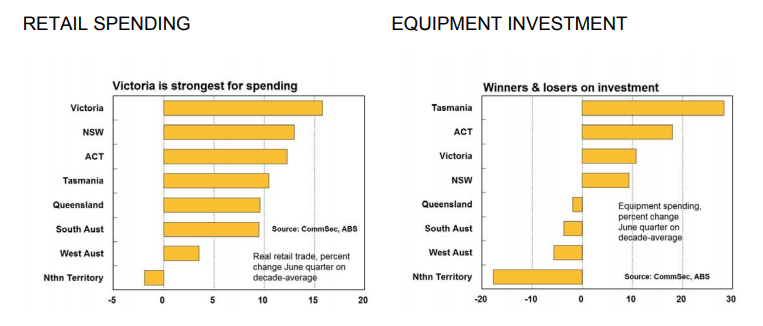
In a responsibly conservative style, the Opposition Leader offered some hope for a new consensus between business and Labor that would also tackle the climate change emergency. Not being able to find the full text of Anthony Albanese’s headland address to the nation from the CEDA forum in Perth, I must reply on the synopsis from Matt Coughlan of the West Australian (29 October 2019):
Labor leader Anthony Albanese has vowed to “circuit-break” a crisis in training and vocational education with a new federal agency targeting skills and workforce shortages.
Mr Albanese used his first major policy speech as opposition leader to promise to create a Jobs and Skills Australia under a Labor government.
“I am determined to circuit-break the crisis in training and vocational education,” he said in Perth on Tuesday.
The agency would be established with legislation and in partnership with large and small business leaders, unions, regional experts and federal, state and territory governments.
Mr Albanese wants it to be data-driven, working with labour market technology from professional websites Seek and LinkedIn.
He said the new agency would have a similar model to Infrastructure Australia, which he established as minister in 2008 and has since become bipartisan policy.
“A collaborative model to guide investment in human capital, just as Infrastructure Australia guides investment in physical capital,” he said
Jobs and Skills Australia would undertake:
* Workforce and skills analysis
* Capacity studies, including for emerging and growing industries
* Specific plans for targeted cohorts such as the regions, workers aged over 55 and youth
* Reviews of the adequacy of the training and vocational system.
It would have an obligation to undertake workforce forecasting skills assessments for majority government-funded services like the National Disability Insurance Scheme, aged care and health.
Mr Albanese said Jobs and Skills Australia would form the basis of a new compact.
“It will work with business and unions to harness insights from industry to ensure that training is meeting not just today’s needs but to anticipate how work is changing,” the opposition leader said.
In coming months, Labor will also look at industrial relations reforms to address job insecurity and uncertainty for workers.
As Australian investment trends worsen, even the federal LNP has decided to endorse a cautious energy transition agenda which still includes the possibility of new and upgraded coal fired power stations (The Guardian, 30 October 2019):
An extra $1bn is being handed to the Clean Energy Finance Corporation to invest in projects aimed at ensuring a reliable electricity supply.
The new fund – separate to the corporation’s existing capital – will be earmarked for power generation, storage and transmission projects such as pumped hydro, batteries and gas.
Eleven of the 12 new generation investments shortlisted for the Coalition’s energy underwriting program are also eligible for funding, although Guardian Australia has confirmed that both new coal power stations and coal power upgrades will be ineligible.
The underwriting program shortlist includes a proposed upgrade to an existing coal-fired power station in NSW’s Lake Macquarie put forward by coal baron and LNP donor, Trevor St Baker.
Labor’s carbon emission targets are highly compatible with the infusion of new investment in both energy transition and support for new infrastructure particularly in depressed regions and the outer-suburban fringes as covered in a recent 7.30 Report.
To avoid a repeat of the highly successful LNP scare-campaigns against progressive taxation measures, investment funding for the economy of the future must surely come from the local financial sector and overseas investment. Both Paul Keating and Anthony Albanese want no immediate return to traditional stimulus spending models against previous investment down-turns (Shane Wright for the SMH, 29 October 2019):
All governments have been urged by the Reserve Bank of Australia (RBA) to use low rates to expand their infrastructure programs in a bid to drive down the unemployment rate and lift wages. The RBA’s official cash rate sits at a record low of 0.75 per cent while interest rates on government debt are at near-record lows.
Mr Keating said with monetary policy barely having an impact, and the economy growing at 1.4 per cent, it was time for the government to develop a growth-led agenda.
The economy is idling at the lights, it’s like the car idling at the lights, waiting for the lights to turn green again to take off,” he said. “The economy at 1.4 per cent is simply idling.”
Mr Keating, who oversaw the first budget surpluses since the 1950s when he was treasurer, said Howard government treasurer Peter Costello had been correct to follow with more surpluses. But that focus on a return to surplus was now risking the broader economy, with too many within the Liberal Party believing the budget should be run like a small corner shop.
As member for Whitlam in the House of Representatives, Stephen Jones has taken the case for more investment in sustainable mining to assist in building the new economy
Greg Jericho’s critical economic analysis in the The Guardian (22 October 2019) does suggest that the federal LNP is starting to believe its own rhetoric about economic competence during a time of global economic downturn:
Given the market sector is roughly 82% of the economy, you would expect it to contribute around 80% of the growth in the economy every year. And yet over the past year, the non-market sector actually contributed more to economic growth than did the market sector.
The market sector only accounted for 44% of the growth in the economy, and when we exclude mining, that number falls to just 15%:
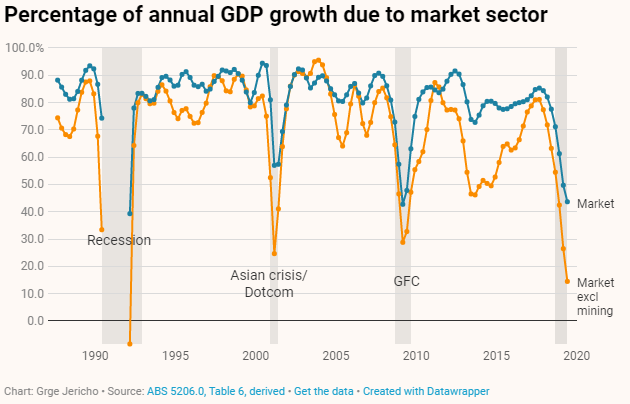
Government revenue has been artificially inflated by the failure of the senate crossbench to deliver company tax reductions for large companies.
As noted by Michael West the extra revenue has come in handy if commitment to a budget surplus is to be achieved in the current financial year (Alan Austin for Michael West, 14 October 2019):
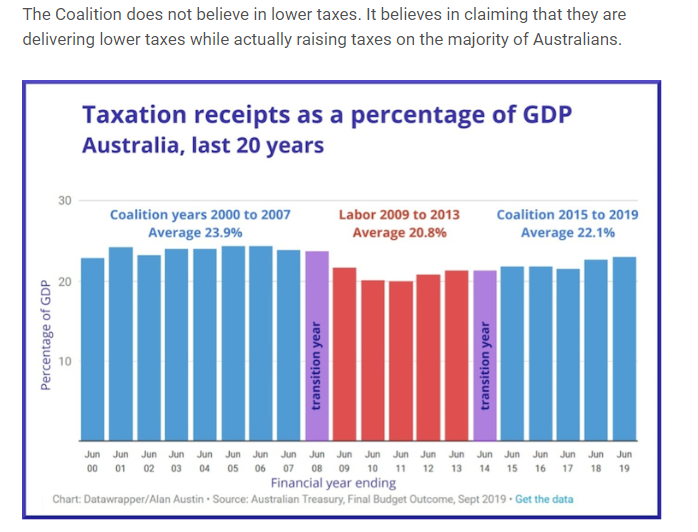
Down in Tasmania which received favourable comments in CommSec’s Leagues Table, the myth of a thriving market economy rests on extraordinary levels of federal largesse to the extent that 62 per cent of all revenue raising is derived from grants from Canberra to support the 2019-20 state budget.
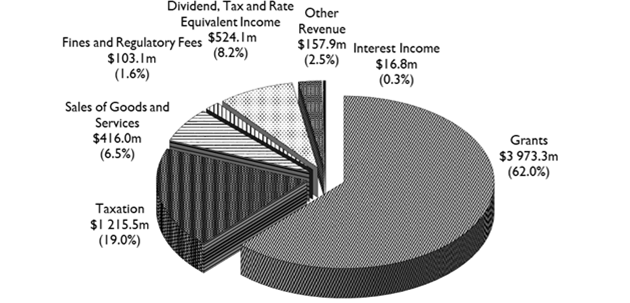
But still the State of the States comparisons continue each month and are reported as fact on mainstream news services.
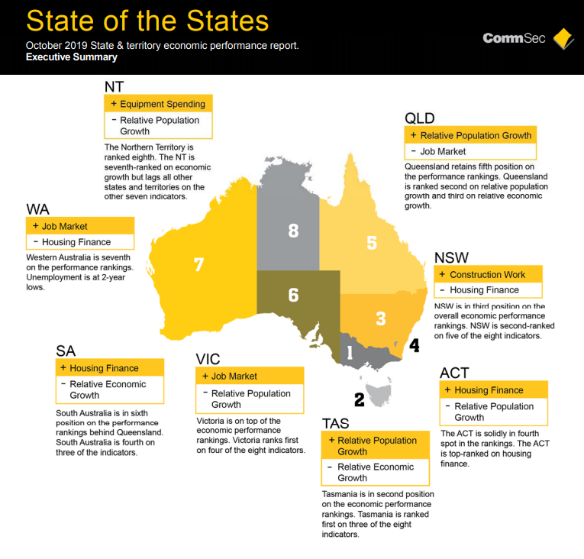
Change will not come easily in a slowing national economy. Some welcome green shoots have been generated this week on both sides of politics. Without an Australian financial node equivalent to Wall Street, the City of London or the Chicago Mercantile Exchange (CME), Australians might choose to unite around social market values appropriate to a middle-sized open economy which predated the ANZAC traditions of 1915.
Anthony Albanese has made a good offer of greater consensus-building at the CEDA forum.
Regrettably, appeal from Labor for greater consensus-building is not new. It was indeed welcomed by Paul Kelly in an outstanding opinion piece in The Australian (30 October 2019).
At least the Morrison Government is now on board the energy change bus with a promise of $1 billion for Labor’s Clean Energy Finance Corporation which was established in 2012.
Perhaps the most progressive federal LNP’s spin doctors have been reading some Labor media releases from another era (from Jason Clare as Shadow Minister for Climate Change and Energy, 22 January 2019):
Most of the benefits of hydrogen development will be in regional Australia. For example, the deep-sea water ports of Gladstone and Newcastle are well placed to support a hydrogen export industry. While benefiting the nation as a whole, regional Queensland will be the big winner from Labor’s plan. Labor is taking a hands-on approach to supporting the new jobs and industries Queensland needs for the future.
We want regional Queenslanders to have good, secure blue-collar jobs for the future in existing and new industries.
Hydrogen can be the next great energy industry for Australia – and Labor has a plan to make it happen.
During the federation era (1901-14) prior to the formation of the Country Party, Alfred Deakin once reached across the political divide to form as association with Andrew Fisher through a progressive phase of social liberalism. The current associations between the Liberal Party and populists from both the National Party and One Nation are barriers to the return of such historical precedents. As a traditional Laborite, Billy Hughes returned Australia to the centre-right of politics which he broke with the Labor caucus over his support for conscription for the war in Europe which failed on two occasions.
Joe Lyons (Scullin’s Treasurer) also broke with the Labor caucus over his neoconservative plans for economic recovery from the Great Depression.
The Liberal Party’s current dalliance with populists in both One Nation and the National Party is an optional association which Scott Morrison can choose to terminate in the interests of economic sustainability with Labor’s support in the Deakinite traditions of the federation era.
Action on energy transition and economic sustainability in a global warning era will require bi-partisan support. The National Party and One Nation will never a more diluted populist thunder.
Look out for the Political Change Bus in the electorates around the country to break the frustrating delays in progressive Australian public policies. Perhaps the needs of people and their environments in a middle-sized open economy will ultimately receive bipartisan attention.
 Denis Bright (pictured) is a member of the Media, Entertainment and Arts Alliance (MEAA). Denis is committed to citizens’ journalism from a critical structuralist perspective. Comments from Insiders with a specialist knowledge of the topics covered are particularly welcome.
Denis Bright (pictured) is a member of the Media, Entertainment and Arts Alliance (MEAA). Denis is committed to citizens’ journalism from a critical structuralist perspective. Comments from Insiders with a specialist knowledge of the topics covered are particularly welcome.
Like what we do at The AIMN?
You’ll like it even more knowing that your donation will help us to keep up the good fight.
Chuck in a few bucks and see just how far it goes!










20 comments
Login here Register here-
Marcia -
Phil Pryor -
Chris -
Pat -
Michael Taylor -
Leila -
Kaye Lee -
Marcia -
Kaye Lee -
johno -
rubio@coast -
Kaye Lee -
Alan Nosworthy -
Vikingduk -
Alan Nosworthy -
Tessa_M -
James Robo -
Lara G. -
Stella -
Paul
Return to home pageIt’s good news at last that Scott Morrison is ready to implement Labor’s Clean Energy policies – a message to the far right of conservative parties that he must represent his electorate of Cronulla as well as the rest of Australia where climate change is a real worry.
Queensland has always been suspect in its intellect and attitude, but certainly seems to be our own “retarded Alabama”. It was our only slave state, and contrasts very strongly with South Australia, our only free state. Something anti-intellectual, bluntly fantasist and superstitious drives the politics there. An inability to face life, facts, logic, science, decency, common sense and prudence literally cripples their approach. A small mussolinian turd like Canavan, or a pot of ignorant lard like Christensen can get a go, let alone the excemental Hanson, Palmer, Katter, etc. Shackled to conservatism lately has been depressingly retarding anyway, but the Queensland connection is frightful, for progress and safety and foresight are needed to save the great reef for all of us on the planet. It stinks.
Our middle-sized open economy needs a change of direction. I doubt if the budget targets are going to be achieved unless some of the tax cuts to higher income earners are shelved. An increase in the Medicare levy is essential to ensure that doctors and allied health personnel are not working for a pittance.
Thanks Denis for this well researched article in the Going Forward traditions on Julie Gillard whose government set up the Clean Energy Corporation.
Well written, Denis. Plenty to take in.
The Federal Government needs to realise it can’t keep fooling people into thinking climate change is not happening at a reasonably rapid pace.
Australians want the Government to acknowledge the change and develop a positive action plan to assist in managing the change. Whatever happens all Australians need to feel supported and assisted with the changes.
“Perhaps the needs of people and their environments in a middle-sized open economy will ultimately receive bipartisan attention.”
I wish I could agree but evidence is obviously not going to get us there. Morrison is an ad man. He will do what he thinks will make him popular. It is up to all of us to send the message that he must lead his government out of the quicksand of climate change denial and ill-informed obsessions with coal. Someone needs to explain to Matt Canavan the advantages of dispatchable power and demand management.
The disagreement between Matt Canavan and Scott Morrison was about significant policy issues.
There are front benchers in the Liberal party who might want to give consensus building a go so that the influence of the far right can be contained if Australia is headed for an economic slowdown.
We will have to wait and see.
Are these guys for real?
Prime Minister Scott Morrison is examining ways to outlaw the “indulgent” practice of businesses refusing to provide services like banking or insurance to the coal sector.
I think some of our largest corporations should listen to, and engage, their ‘quiet shareholders’, not just their noisy ones,” Mr Morrison will say.
“Let me assure you this is not something my government intends to allow to go unchecked.”
“Together with the attorney-general, we are working to identify mechanisms that can successfully outlaw these indulgent and selfish practices that threaten the livelihoods of fellow Australians.”
Mr Dutton said the government would look at federal legislation to strengthen laws to charge protesters.
“….the disruption that they seek to cause, the disharmony that they seek to sow within our society s unacceptable.”
https://www.9news.com.au/national/climate-change-protests-australia-scott-morrison-to-crack-down-on-activists/db5f8dde-1b6e-4875-8e02-6050cae32057
So businesses can’t decide who they will provide services to and shareholders can’t decide what they will invest in. Unless they are religious of course in which case they can cause as much disharmony and division as their little hearts desire.
Ha ha, the anti regulation small government LNP will regulate when big pollution business’s are threatened.
The Outer Suburbs are not longer Labor’s heartland as shown in yesterday’s Guardian article. Also, Labor did not make it across the line in winnable seats like Robertson last time on the Central Coast near Sydney.
https://www.theguardian.com/australia-news/2019/oct/31/labors-path-to-victory-lies-in-australias-outer-suburbs-jim-chalmers-says
Reclaiming these areas is vital for change as promoted by Albo and Jim Chalmers who are on the same unity ticket.
johno,
I can’t wait to hear how Scott will force insurers to insure coal mines or banks to lend them money or superannuation funds to invest in them.
rubio,
Lucy Wicks is a waste of space. I think the large number of retirees here in Roberstson got her over the line last time but I will be amazed if she scrapes home again next time. For three elections now she has told me she is fixing our mobile black spot. Still waiting Lucy.
Phil Pryor, the purpose of your narrowly negative comments to another excellent article by Queensland journalist Dennis Bright is hard to fathom. If your wish is just to express your ignorance of the realities of life in the sundrenched north you have succeeded. If you intended to make a meaningful contribution to further discussion I suspect you have failed miserably. Better luck next time, I hope that with a little application and research you may succeed
Just for the hell of it, no surf, triathlon taken over Noosa, happy clappers well entrenched in Noosa junction, l thought I would like to express my ignorance of the realities of life in qld, beautiful one day, rooted by the braindead the next. And no, I don’t intend to make a meaningful contribution to further discussion, I do it because I can.
If you don’t like the bullshit I, or anyone else has to say, change the fcking channel, don’t read it, move on.
Dukiduki diddums, good on you, you have achieved your stated aims of displaying your ignorance and not contributing anything worthwhile to the discussion. You may now put that in your resume👄
Better planning at all levels of government can reduce carbon emissions. This requires progressive concessions and an end to illusions that we live in a strictly market economy.
Great ideas Denis. Keep up the good work.
Surely political consensus will win out in Australia: Thanks for the well researched article Denis
Thanks for an interesting article about the Australian political scene.
Thanks for the awesome article Denis!!! Some excellent insights there to think over!!!